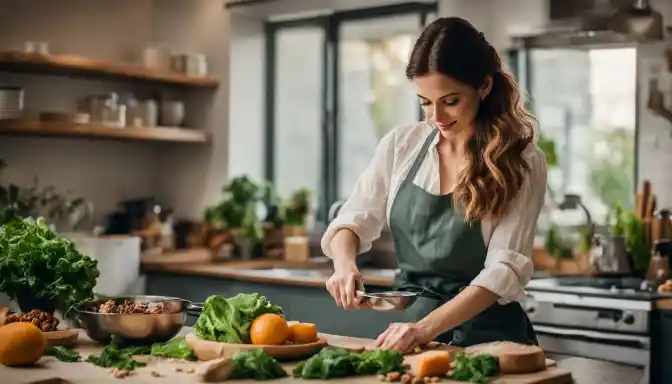As we age, our bones can be a silent concern that creeps up on us. After reaching the milestone of 50 years old, maintaining bone health becomes increasingly important to prevent fragility and maintain an active lifestyle.
Many senior homeowners are seeking ways to keep their bones strong and healthy as they enjoy their golden years.
One pivotal fact is clear: nutrition plays a critical role in sustaining bone density and reducing the risk of osteoporosis. This blog post will unfold the essential foods recommended by nutritionists that support bone fortitude after 50.
We’ll guide you through making dietary choices that bolster your skeleton’s strength, ensuring you’re well-equipped to protect your frame against time’s test. Ready for stronger bones? Let’s dive in!
Key Takeaways
- Eat calcium – rich foods like dairy, leafy greens, and canned fish to keep bones strong after 50.
- Include vitamin D in your diet for better calcium absorption; get it from sunlight or fortified foods.
- Protein is important for bone health; eat eggs, nuts, and seafood to help bones rebuild and repair.
- Exercise such as strength training and weight – bearing activities can improve bone density.
- Avoid too much salt and sweet drinks which can weaken bones; choose water or fortified juices instead.
The Impact of Age on Bone Health

Bones can get weaker as you age. After 50, your body may break down bone faster than it builds new bone. This can make bones less dense and lead to conditions like osteopenia or osteoporosis, where bones are brittle and more likely to break.
Good food choices help keep bones strong over time. Calcium is very important for healthy bones, especially for older adults. Your need for vitamin D also goes up as you grow older because it helps your body use calcium better.
Eating foods rich in these nutrients supports bone health at any age, but it’s extra crucial after 50.
Understanding the Role of Nutrition in Bone Health

Good food keeps your bones strong. Just like a house needs bricks, bones need nutrients to stay healthy. Calcium is the hero for bone strength. Your body also needs vitamin D to help it use calcium.
Think of vitamin D as the key that unlocks the door for calcium to enter your bones.
Proteins play a part too. They’re like the workers who build and mend your bones every day. Foods rich in magnesium, potassium, and vitamins K and C support these workers. It’s important to eat things like leafy greens, nuts, seeds, fish, and oranges to get all these great helpers into your body.
Key Foods for Bone Health After 50
To maintain and promote bone health after 50, integrating certain key foods into your diet is essential; discover these nutritional powerhouses that support a strong skeletal system as you age.
Dairy Products
Dairy products like milk, yogurt, and cheese are great for your bones. They give you a lot of calcium and protein which your body needs as you get older. Eating these foods helps keep your bones strong and can slow down bone loss that happens with age.
Nutritionists often say to have them every day to help your bone health.
Milk and yogurt are especially good for keeping bones healthy, while cottage cheese might not be as helpful. Look for dairy items that have extra calcium added in; they’re even better for you! If you eat fish with bones, like canned sardines or salmon, that’s also good because they have lots of calcium just like dairy products do.
Onions
Onions are not just for flavor. They help your bones too. Studies show that eating onions can make your bones denser, which is especially good for women over 50. This means you might have a lower chance of breaking a hip if you include onions in your meals.
These veggies have stuff like antioxidants and special compounds that fight off diseases, keep cancer away, and even help with blood sugar levels. Plus, they’re packed with good things like vitamins B6 and C as well as potassium.
So adding onions to your diet is not only tasty but also smart for keeping strong bones.
Seafood
Seafood is great for your bones. It has nutrients like omega-3 fatty acids and vitamin D that help keep them strong. Fatty fish, especially salmon, mackerel, tuna, and sardines are super choices.
They have lots of good stuff for bone health after 50.
Oysters stand out too because they’re full of zinc. This mineral is key for maintaining bone mass as you age. Plus, a nice piece of salmon not only tastes good but also gives you phosphorus and more vitamin D to support your bones every day.
Prunes
Prunes are a sweet treat that can do wonders for your bones. Packed with vitamin K, they’re not just good to eat—they help keep your skeleton strong. These chewy fruits have special nutrients and substances that are great for bone health.
Studies show munching on prunes every day might help women, especially after menopause, keep their bones dense and tough.
Think of prunes as tasty helpers in your fight against weak bones. They are top-notch food when it comes to supporting strong bones and battling osteoporosis. Yes, they’re sugary, but the benefits they bring along make them worth it.
Prune juice is full of good stuff too! Make these chewy gems part of your well-balanced diet and give your bones the boost they need as you age.
Eggs
Eggs offer big benefits for your bones, especially as you get older. They pack a punch with vitamin D and zinc, which are key for keeping bones strong. Many seniors find that including eggs in their daily diet helps increase bone mass density.
This means fewer worries about brittle bones and more confidence in your body’s strength.
Having eggs on your plate is like giving your bones a health boost. They’re not just good for kids; studies show whole egg consumption supports the hard outer layer of bone known as cortical bone.
Think of it this way: eating eggs is a smart move for maintaining solid and sturdy bones well into your later years. Plus, they’re tasty and easy to cook up!
Citrus Fruit
Citrus fruits like oranges and grapefruits are not just refreshing – they’re also great for your bones. After 50, keeping bones strong is a must, and these tangy fruits help do the job.
They pack a punch of vitamin C, which plays a crucial role in bone health. Eating them can be part of preventing conditions like osteoporosis.
You’ll want to include both the juice and pulp of grapefruit in your diet because they support bone strength. Don’t forget other vitamin C stars such as papaya and pineapples too; they make tasty options for looking after your bones while enjoying natural sweetness.
Alcohol (Moderate Consumption)
A little bit of alcohol might be a good thing for your bones after 50. Studies tell us that drinking in moderation can help keep your bone mineral density up. This means bones stay stronger as you get older, and the chance of losing too much bone gets lower.
But hold on, not all drinking is good for you. Having too much can make your bones weak and raise the risk of breaking them. Osteoporosis, a condition where bones get very weak, becomes more likely if you drink heavily.
So, enjoy a glass now and then but keep it light to help those bones stay right.
Surprising Foods that Boost Bone Health
While you may be familiar with some classic bone-strengthening foods, there are several surprising contenders that pack a serious punch for maintaining bone density post-50. Integrating these unexpected foods into your diet can offer an added edge in the fight against age-related bone loss.
Nuts and Seeds
Nuts and seeds are like tiny powerhouses for your bones. They pack a punch with healthy fats, protein, calcium, and magnesium. Think of almonds as little bone-building helpers; they have special compounds that make your bones strong.
Plus, the ALA omega-3 fats in chia seeds and walnuts give your bones an extra health boost.
Eating these crunchy snacks can help keep your bones tough like a young person’s. Your body needs magnesium and phosphorus too, which nuts and seeds have plenty of. So toss them into salads or munch on a handful as a snack—it’s a tasty way to fight off weak bones and stand up against osteoporosis as you get older.
Cruciferous Vegetables
Cruciferous vegetables are great for your bones, especially after 50. Eating foods like arugula, broccoli, and Brussels sprouts gives you nutrients that help keep bones strong. These veggies have vitamin K and calcium which are important for bone health.
You can add these powerful plants to your meals in many ways. Try them steamed as a side dish or toss them into a salad. They do more than just support your bones; they also boost your immune system.
Include cruciferous vegetables in your diet to help your body stay healthy and fight off problems as you age.
Beans
Beans are great for keeping bones strong as you get older. They have a lot of fiber, protein, and iron. These are all important for building bones that can last. While beans do contain something called phytates which might make it harder for your body to use the good stuff in food, eating beans actually links to having healthier bones.
Think about adding different kinds like black beans, kidney beans, pinto beans, or edamame to your meals. They’re not just nutritious but also very tasty and can mix well with lots of dishes.
Making sure to eat your beans could be a smart move for staying strong and healthy after 50!
Fatty Fish
Fatty fish are great for your bones. Think about salmon, mackerel, sardines, and anchovies. These fish have lots of good things like omega-3 fatty acids that help keep your bones strong.
Eating fish might even make it less likely you’ll have bone problems later on.
Canned salmon is a winner when it comes to calcium because of the tiny bones inside that are easy to eat and full of this bone-building mineral. Omega-3s do more than just taste good; they work hard to lower the chance of breaks and slow down bone loss, keeping you stronger as you age.
Fortified Juices and Whole-Grain Cereals
You might be surprised to learn that your morning juice or bowl of cereal can help keep your bones strong. Some juices and cereals are boosted with extra calcium and vitamin D, which are key for healthy bones.
If you see “fortified” on the label, it means these important nutrients have been added.
Choose fortified orange juice and whole-grain cereals as part of a bone-healthy diet. Nutritionists say this is a smart way to up your calcium intake without much effort. Drinking fortified juices and eating whole-grain cereals each day is like giving your bones a bonus in their fight against aging.
Nutrient-Packed Foods for Strong Bones
Ensuring your bones stay healthy and robust after 50 involves more than just calcium; it’s about a symphony of nutrients working in harmony. Dive into our lineup of nutrient-dense superfoods that are the unsung heroes in the quest for maintaining bone density and overall health as you age.
Salmon
Salmon is a powerhouse for your bones. This fish gives you omega-3 fatty acids and vitamin D, both huge helpers for keeping bones strong. Think about it like this: every bite of salmon is a step toward better bone health.
Your body needs enough protein to protect against fractures, and salmon has plenty of that good stuff.
You also get calcium, magnesium, and anti-inflammatory benefits when you eat salmon. These nutrients work together to keep your bones in top shape as you age. Make sure it’s on your plate regularly — your bones will thank you! And don’t worry about getting bored with the same old recipes; there are lots of tasty ways to enjoy salmon that’ll also keep your skeleton sturdy.
Kale
Kale is a true champion for your bones, especially if you’re over 50. This leafy green brings a powerhouse of nutrients to the table, including fiber, antioxidants, calcium, and vitamins C and K.
Both vitamins play a huge role in bone health. Vitamin K works to strengthen your bones by helping calcium stick where it’s needed.
Think of kale as your edible shield against brittle bones. It stands out among dark leafy greens with its ability to fight off inflammation and keep your skeleton strong. Including kale in your meals can be easy – toss it into salads, blend it into smoothies or add it to soups.
With this superfood on your side, you’re giving your body the tools it needs for maintaining healthy bones as you age.
Bell Peppers
Bell peppers add a colorful punch to your diet and are bursting with nutrients that keep your bones strong. These tasty veggies have plenty of vitamins C and K, both heroes for bone health.
And guess what? They won’t weigh you down—bell peppers have just 39 calories per cup! Eating bell peppers is smart if you want to help your body take in more iron from other foods, which is also great for your bones.
Now consider the red bell pepper—it’s not just another pretty veggie on your plate. It’s packed with six times more vitamin C than its green cousin, making it a powerhouse for bone health.
Including red bell peppers in meals along with calcium-rich foods and sources of magnesium and vitamin D helps fight against bone problems like osteoporosis. Keep those bones healthy by crunching on some delicious bell peppers!
Tofu
Tofu is a smart choice for keeping bones strong, especially after 50. It’s full of good stuff like calcium and magnesium which are important for bone health. Tofu also has phosphorus and special plant compounds called phytoestrogens.
These act a lot like estrogen in your body, which helps your bones stay healthy.
Eating tofu could be part of your plan to care for your bones as you get older. Nutritionists suggest adding it to meals since it supports bone strength. It’s often used in different recipes so you can enjoy variety while looking out for your bones!
Pumpkin Seeds
Pumpkin seeds are tiny but mighty when it comes to keeping your bones strong after 50. These small seeds pack a punch with lots of magnesium, which helps bones grow and stay tough.
They also bring protein and iron to the table, even more than chia or flax seeds for each ounce you munch on.
You can enjoy pumpkin seeds as a quick snack or mix them into meals for extra bone health benefits. Nutritionists love them because they’re not just good for your bones; they’re easy to add to your diet too.
Crunch on these seeds any time you need a tasty boost that’s great for your body.
Foods to Avoid for Healthy Bones
Eating too much salt is not good for your bones. Foods like chips and frozen dinners have a lot of salt that can make you lose calcium. This could lead to weaker bones. Sweet drinks like soda also might hurt your bone health.
They stop your body from taking in calcium and may lower the strength of your bones.
Be careful with sugar, as it can cause you to lose important minerals for strong bones through pee. Even if older people usually need more beans, spinach, and beets, these foods can make it hard for the body to use calcium well due to natural chemicals they contain called oxalates.
So, try not to eat too many of these if you want healthy bones after age 50.
The Role of Exercise in Bone Health
8. The Role of Exercise in Bone Health: Integrating specific exercises into your routine can be a game-changer for bolstering bone strength after 50; discover the types that have the most impact on your skeletal well-being.
Strength Training
Strength training is a powerful tool for your bones. Lifting weights and doing exercises that make you work against gravity are not just for young people; they can help you too. These activities make your muscles push and pull against your bones, which helps keep them strong.
Science says strength training can even build new bone. That’s good news if you’re worried about weak bones or osteoporosis. You don’t have to lift heavy weights either – light weights or simple movements using your body weight can do the trick.
So, grab some dumbbells or start with exercises like squats and wall push-ups to give your bones what they need to stay sturdy!
Weight-Bearing Exercises
Walking fast, dancing, or climbing stairs helps your bones. These are weight-bearing exercises. They push your legs and lower spine to work hard against gravity. Doing this often can make bones in these areas stronger and slow down bone loss.
You might think exercise is just for staying fit. But it’s also key for strong bones after 50. Move around a lot, especially in ways that use your body weight. It tells the bones in your hips and back to keep tough and not get weak.
Importance of Protein for Bone Health
Protein is like the building blocks that help keep your bones strong, especially as you get older. After 50, your bones need more care to stay healthy, and eating enough protein is a big part of this.
Protein works with calcium to make sure your bones can rebuild and repair themselves. This means when you eat foods high in protein, you are helping to protect your bones.
Foods such as eggs, dairy products, nuts, and fish are great for giving your body the protein it needs for bone health. You want to make sure you’re getting plenty of these foods in your diet if you’re over 50.
Think about adding some grilled chicken to your salad or having yogurt with fruit for breakfast. These choices not only taste good but also give those important nutrients that keep bones strong in later years.
The Role of Calcium in Bone Health
Calcium is essential for building strong bones and is key to lifelong bone health. Your bones need it to stay hard and tough. As you get older, your body needs more calcium to keep your bones in good shape.
Dairy products like milk, cheese, and yogurt are full of calcium that’s easy for your body to use. Leafy greens such as kale, collard greens, and turnip greens also have lots of calcium.
Eating these foods can help you avoid weak bones that break easily. Vitamin D helps your body absorb the calcium you eat. Without enough vitamin D, all the calcium-rich food won’t be as helpful.
So make sure you’re getting sunshine or eating fortified foods with vitamin D too.
What to do if You’re Concerned About Bone Loss
If you worry about bone loss, talk to your doctor. They might suggest a DEXA scan to check on your bones’ health. This can tell if you have low bone mass or if it’s osteoporosis starting.
Your doctor may also discuss calcium supplements and vitamin D levels with you. These nutrients are buddies for strong bones.
Another key player is vitamin K2, especially the form called MK-7. It helps make sure calcium goes into bones and not arteries, keeping them sturdy. Vitamin D deficiency is common, so getting enough from sunlight or foods like fatty fish and fortified juices matters a lot too.
Remember physical activity – resistance training helps build bone strength at any age!
Conclusion
Taking good care of your bones after 50 is important. Enjoy foods like dairy, leafy greens, and fatty fish for strong bones. Remember to pair healthy eating with exercise. Make these habits part of your daily life.
Eat well and stay active for bone health!
You care about your bones, especially after turning 50. You want to keep them strong so you can stay active and enjoy life. Good news: the food choices you make can help a lot. This blog will show you which foods are best for keeping bones in top shape and why some others might not be helping as much as you think.
Eating right matters more now than ever because your bones change with age. They need different nutrients to stay tough like Vitamin D and calcium found in dairy products or leafy greens.
We’ll also talk about how too much of certain things—like soda or very low-calorie diets—might harm bone strength. Let’s get those bones the nutrients they need!
Discover how you can stay mobile and active by exploring the latest trends in affordable electric vehicles, perfect for ensuring that you get to all your favorite healthy food spots.
FAQs
1. What foods are good for bone health after 50?
Nutritionists suggest eating foods rich in calcium, vitamin D, and sources of omega-3 like fish or plant milks to help keep bones strong.
2. Why is vitamin D important for bones?
Vitamin D helps your body use calcium, which is very important to build and keep bone mass as you get older.
3. Can what I eat affect my chance of getting osteoporosis?
Yes, eating healthier food with enough nutrients can lower your risk factors for osteoporosis, especially in postmenopausal women.
4. Should people over 50 avoid certain drinks for bone health?
It’s wise to have less sodas and drinks with caffeine or alcohol since they might lead to weakened bones by affecting how the body handles minerals like calcium.
5. Is being underweight bad for my bones if I’m over 50?
Being underweight can mean a higher chance of reduced bone density, so it’s key to maintain a healthy weight through nutrition and strength-training exercises.
6. Do I need to take extra supplements for strong bones after 50?
If your diet does not give you enough nutrients needed for strong bones, supplementing with things like calcium or vitamin D might be helpful but always check with a doctor first.
Source Links
- https://www.bonehealthandosteoporosis.org/patients/treatment/nutrition/
- https://www.health.harvard.edu/womens-health/surprising-foods-that-boost-bone-health
- https://www.everydayhealth.com/diet-nutrition/7-best-bone-building-foods/
- https://www.healthline.com/nutrition/build-healthy-bones
- https://www.seattletimes.com/life/wellness/its-never-too-early-to-eat-for-healthy-bones/
- https://www.henryford.com/blog/2022/02/how-to-eat-better-to-support-stronger-bones
- https://www.everydayhealth.com/osteoporosis/what-eat-what-avoid-healthy-bones/





